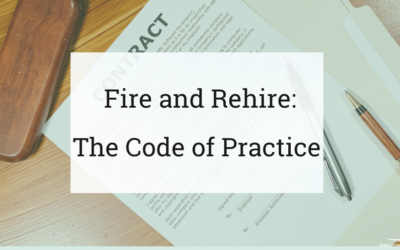🎼🎙“Ding dong merrily on high,
The cash register bells are ringing:
Ding dong! verily they buy
The shopping bags are swinging!” 🎄

Christmas is a really busy time for everyone, especially those in the food retail sector. With supply chain issues for larger retailers, it is likely that smaller independent retailers will welcome more customers than in previous years and will therefore require more staff to service the needs of customers.
Most employers will have a range of staff employed to suit their needs, but sadly, more staff means more risk for employers. In most disputes, the first document that we will ask to see is the contract of employment, it is vital that you have the Correct Clause 🎅 to reflect the type of working relationship that you have.
It is likely that to meet your additional staffing needs you will recruit either fixed term employees or zero-hour workers, but before we can understand the correct clauses needed for these relationships we need to know what is legally required for employment contracts generally.
What should be included in a contract of employment?
The Employment Rights Act 1996 determines what should be included in a contract of employment, it states that among many other details, you must inform the employee of:
- when their employment began;
- who will be employing them
- their job title;
- their normal place of work;
- their days and hours of work;
- their rate of pay;
- terms relating to annual leave, sickness and pensions;
- the appropriate notice periods;
- any collective agreements that may apply (in unionised workplaces only);
- any training that may be required.
These must all be detailed in one document which should also include reference to any statutory schemes that the employee can benefit from, for example maternity pay and leave, parental bereavement leave, how to make a protected disclosure (blow the whistle) or flexible working to name a few.
By providing all of the above employers will be on their way to issuing a compliant contract of employment. For the avoidance of doubt, our lawyers can review your documents as part of the free advice service that Members can access via the FRA.
What is advisable to be included in a contract of employment?
There are many clauses that are advisable to have in a contract of employment, each clause needs to be correctly drafted to ensure that businesses have the best protection. Employers should take advice before relying on a clause as it is often the case that you need to follow specific procedures and failing to do so could result in litigation.
We advise that employers should include correct clauses relating to:
- flexible job duties;
- lay off and short-time working (essentially temporary redundancies – useful in cases of unforeseen interruption for example flooding);
- medical assessments for employees;
- deductions from pay;
- confidentiality;
- secondary employment;
- variation;
- jurisdiction (to ensure that any litigation is heard in the appropriate courts);
- garden leave and non-compete clauses for the appropriate staff.
Of course, the requirements of each business are different; it may be that you provide staff discount, bonuses, commission, overtime or have company vehicles, all may require their own clause or policies. It is always best to take advice and ensure that your contracts reflect the way in which you work today but also suit the actual needs of the business. Providing employers with protection from the myriad of risks that can arise from having employees. We are of course on hand to assist with any specific queries that you may have.
Part-Time or Full Time
A common misconception is that when an employee works a certain number of hours they become full time. The reality of this is different, the law does not define full-time or part time employment, an employee who works 3 hours a day Monday – Friday could be considered full-time. This is of particular importance when calculating annual leave.
In terms of the correct clause employers need to ensure that the hours and days of work are properly detailed. No other significant changes are suggested for part-time employees.
It may be that employers wish to remove certain entitlements, for example the right to have staff discount, but you must remember that the that Part-time Workers (Prevention of Less Favourable Treatment) Regulations 2000 do exactly what they say on the tin, they prevent you from treating an employee less favourably, for example withholding staff discount.
Fixed Term
Fixed term employees are employed for a fixed period, usually to work on a set project. So whether you recruit staff to just cover the Christmas period or to work from Halloween to New Years Eve employers need to ensure that they have the correct clause.
Employers taking on a fixed term employee should ensure that they include two additional clauses. The first, stating the fixed nature of the contract and that it shall come to end on a specified date. The second, and possibly the most important, is the early termination clause. Although employers can terminate by giving notice in the usual way, terminating a fixed term contract early could result in the employee being entitled to pay for the remaining term of the agreement. For example, where an employee working under a 6 month fixed term contract (such as a Kickstarter) is dismissed after the first month they could be entitled to the remaining five months worth of pay, unless the right to terminate before the end of the fixed term period is reserved in the contract.
Some employers may wish to use a fixed-term rolling contract, in other words where the contract automatically rolls over for another month unless terminated. This can be a useful tool, but for those employers who believe that this type of agreement would break the continuity of employment they are sadly mistaken. Furthermore, this can cause a whole manner of confusion when it comes to annual leave entitlements and payment for untaken annual leave at the end of the contract each month.
As with part-time workers, the Fixed Term Employees (Prevention of Less Favourable Treatment) Regulations 2002 prevent you from treating an employee less favourably so please do exercise caution if you have different benefits, rates of pay or annual leave entitlements etc.
Zero Hours
Zero hours workers are different to employees, they have different rights and protections because they are classified as workers. The difference between employees and zero-hours workers can be a complex area of employment law but it’s certainly one which can help with and answer any questions. It’s important to remember that zero-hours workers cannot be prevented from working at other farm shops so if there is a top-secret attraction a better alternative may be to instruct your regular staff to work overtime instead (contract permitting).
The important thing to remember with zero hours workers is that for them to be genuine, zero hours workers there should be no discernible pattern or no minimum number of hours. If there is, they are not zero hours workers but employees and should be treated as such.
If employers need regular and frequent hours to be completed, zero hours staff may not be the best option. Zero hours staff have the ability to refuse hours and employers have less control over them as they are not technically employed.
Zero hours working is a very complex and controversial area of law and advice should be taken. Those with zero hour workers need specific documentation, terms, and of course the correct clauses – we will happily provide you with those.
Sunday Working
Finally, where employees carry out shop work (as defined in the Employment Rights Act 1996) on a Sunday employers need to ensure that they comply with the law in relation to Sunday working.
Our How to Guide provides FRA Members with all of the information they need to know but, in a nutshell, they must provide all relevant staff with a Statutory Rights Statement within 2 months of employment commencing. The Statement informs them of the right to opt out of Sunday working, even if their contract states that they are required to work Sundays.
It is worth noting that some employees are automatically exempt from working Sundays and that they, or those who opt-out, are protected from dismissal or detrimental treatment in relation to their protection or refusal to work.
Having the Correct Clause can seem like a nuisance, employers will need different contracts and have a lot of obligations to comply with. However, ensuring you have the Correct Clause in place protects you and your business from risk.
If you want your clauses reviewing don’t send them up the chimney on Christmas Eve email them over to [email protected].





